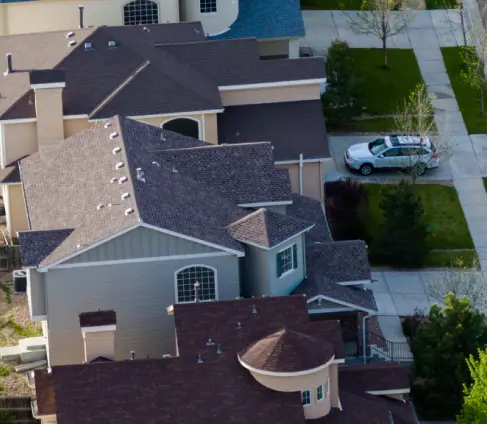By Admin
.21 Oct, 2024

Roofing is one of the most crucial investments you’ll make as a homeowner, especially in a state like Texas, where the climate can vary greatly across regions. Whether you’re preparing for the heat of West Texas, the storms in the Gulf, or something in between, having a durable and well-installed roof is essential. This guide will walk you through the basics of residential roofing in Texas and help you get started with your roofing project.
What Should Be the Budget for a New Roof in Texas?
When planning your roofing project, budget is one of the first things to consider. The cost of a new roof in Texas depends on several factors, including the size of your home, the type of materials you choose, and labor costs. On average, a roof replacement in Texas can range from $8,000 to $20,000. This wide range covers everything from basic shingle roofs to more durable options like metal roofing in Texas.
Additionally, certain factors can increase the cost, such as:
Roof complexity: If your roof has multiple slopes or valleys, it requires more labor and materials, which can drive up the cost.
Material quality: Higher-end materials such as metal roofing or clay tiles are more expensive than standard asphalt shingles but offer better longevity.
Removal of old roofing: If your old roof needs to be removed, there may be additional disposal fees.
To get an accurate estimate, it’s a good idea to consult with roofing contractors in Texas and get multiple quotes.

What Type of Roof Should You Choose in Texas?
Choosing the right roofing material is key to ensuring that your home stays protected in Texas’ diverse climate. Your choice will depend on your location, budget, and personal preference. Here are some common material to consider:
Asphalt Shingles: Asphalt shingles are the most affordable and widely used roofing material across Texas. They are too easy to install and come in a various colors and styles. Shingle roofing contractors in Texas often recommend them for their versatility and reasonable durability. However, shingles may not last as long as other options in areas with intense heat or frequent storms.
Metal Roofing: If you’re looking for a durable, energy-efficient option, metal roofing in Texas is an excellent choice. Metal roofs can withstand high winds and extreme weather conditions, making them a great fit for areas prone to storms or hail. They also reflect heat, which can help reduce your cooling costs in the Texas summer.
Tile Roofing: Tile roofing, often seen in the southwestern part of Texas, is known for its durability and aesthetic appeal. While tile roofs are more expensive to install, they can last up to 50 years or more with proper maintenance. They are also highly resistant to fire and extreme heat, making them ideal for certain parts of the state.
Flat Roofing: Flat roofs are commonly used on commercial buildings but are also an option for some residential homes in Texas. They are cost-effective and easy to maintain but may not provide as much protection against heavy rain without proper drainage systems.
Your local roofing contractor in Texas can help guide you toward the best material based on your region and budget.
What Are the Types of Residential Roofing in Texas?
There are several types of residential roofing in Texas, each suited to different styles of homes and climate conditions. Here’s a breakdown of the most popular roofing options:
Asphalt Shingles: As mentioned earlier, asphalt shingles are the most common choice for Texas homes. They’re affordable and easy to replace, but they may not last as long in areas with extreme weather.
Metal Roofing: A rising trend, metal roofing offers superior durability and energy efficiency. It’s especially popular in areas with high winds, such as coastal regions or tornado-prone parts of Texas.
Tile Roofing: Clay or concrete tiles are favored for their long lifespan and resistance to fire and heat. Tile roofing is more commonly found in the southern and southwestern parts of the state.
Wood Shakes: Wood shake roofs provide a natural, rustic appearance. However, they require more maintenance than other materials and may not be the best option for areas with high humidity or fire risk.
Flat Roofs: These are common on modern or commercial-style homes. While cost-effective, they need good drainage systems to prevent water buildup.
Consulting with roofing companies in Texas is a good idea to help you weigh the pros and cons of each options for your specific location.

Is There any Need for a Permit to Replace a Roof in Texas?
Yes, you will most likely need a permit to replace a roof in Texas. Roofing permits ensure that the work meets local building codes and safety standards. The requirements for permits vary depending on the city or county where your home is located, so it’s essential to check with your local building authority.
For example, larger cities like Houston, Dallas, and Austin typically require permits for roof replacements, while smaller towns may have different regulations. Most roofing contractors in Texas will handle the permit process on your behalf, but it’s a good idea to confirm that the contractor is pulling the proper permits before the work begins. Failure to obtain the necessary permits could result in fines or issues with your home’s insurance coverage.
How to Choose the Best Roofing Contractor in Texas?
Choosing the right contractor is one of the most important decisions you’ll make when starting your roofing project. Here are some keys to look for:
Experience and Specialization: It’s essential to hire a roofing contractor in Texas with experience in the local climate and roofing materials that suit the region. For example, if you live in an area prone to high winds, you may want to choose a contractor specializing in metal roofing or storm-resistant roofing systems.
Licensing and Insurance: Always verify that your roofer is fully licensed and insured. This protects you from liability in the event of accidents or property damage during the roofing process.
Customer Reviews and Reputation: Look for roofing companies in Texas with positive reviews and a solid reputation. Ask for referrals from friends or family and check online reviews on platforms like Google or the Better Business Bureau.
Warranty: A good roofing contractor will offer warranties for both their work and the materials they use. This ensures that you’re covered in case of defects or problems after installation.
Emergency Services: Having access to emergency roof repair in Texas is crucial, especially during the storm season. Make sure your contractor offers 24/7 services for urgent repairs.
What to Expect During the Roofing Process?
Once you’ve chosen a contractor, the roofing process typically follows these steps:
Initial Consultation: Your roofer in Texas will assess the condition of your existing roof and discuss your options for repair or replacement. This is the time to ask about materials, costs, and timelines.
Permit Acquisition: Your contractor will handle obtaining any necessary permits for the project.
Roof Replacement or Repair: Depending on the condition of your roof, the project may involve a full roof replacement or simply repairs to address specific issues. Roof repair companies in Texas can handle everything from minor leaks to full-scale roof damage.
Final Inspection: After the work is complete, your contractor will inspect the roof to ensure it meets all local building codes and standards.
Clean-Up: The contractor will remove all debris from your property and leave your home looking clean and tidy.
Final Thoughts
Starting a residential roofing project in Texas can feel overwhelming, but with the right information and a qualified contractor, the process becomes much easier. Whether you’re repairing storm damage, installing a new roof, or choosing between shingle and metal roofing, there are plenty of options to fit your budget and style. Always work with reputable roofing contractors in Texas who can provide quality service and guide you through the process.
By doing your research and selecting the right materials and contractor, you’ll ensure your home is protected for years to come.